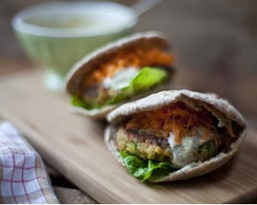|
Well today I can feel that the winter is well and truly here. Hallo scarfs and jackets and boots and hats, one of the many reasons I love winter. What I don't like about the winter is the few extra kilo's we all seem to collect along the way, because hallo meaty casseroles and hot chocolate and wine! It seems that these few extra kilograms are unavoidable, but we are here to help. For the next 2 months we will be publishing delicious winter recipes that will satisfy and fill you up, with the added bonus of being healthy and good for you. And just so that you can feel really proud of your healthy dinner, we have added all the benefits at the bottom of the recipe. So here is our first recipe, and it fits in perfect with MEAT FREE MONDAYS. Enjoy! Recipe: Ingredients * 1 x 400g can of chickpeas, drained and rinsed * 60 g breadcrumbs * 2 tbsp. smooth peanut butter * 1 large egg * 1 tsp ground coriander * 1 tsp ground cumin * 6 spring onions, chopped * 2 tbsp. rapeseed oil * 150 g natural yogurt * 1 tsp masala * 4 wholegrain pitta bread, to serve * salad leaves, to serve * carrots, grated, to serve Method 1. Place half the chickpeas in a food processor with the breadcrumbs, peanut butter, egg, coriander and cumin and blitz until smooth. Remove the blade and stir through the remaining chickpeas and the spring onions. Season with sea salt and ground black pepper. 2. Form the mixture into four 10cm wide burgers. Place on a plate and cover, leaving to sit in the fridge for at least 2 hours to firm up. 3. Place a large frying pan over a medium–high heat and add the oil. Fry the burgers in the pan for 5–6 minutes on each side, until they have a nice golden colour. 4. In a small bowl, mix the yoghurt with the masala. Toast and split some wholegrain pitta breads. Serve the warm burgers in the pitta breads with the spiced yoghurt, salad leaves and grated carrot. Tips and suggestions If you don't have time to wait two hours for the mixture to firm up you can blend the chickpeas and use the mixture immediately. Just be more careful to keep the burgers in shape in the pan. Why this recipe is packed full of healthy goodness
Health Benefits of Peanut Butter: Source of Protein 2 Tablespoons of peanut butter contains 7 grams of protein. This is why peanut butter on toast makes for a great breakfast or mid-morning meal choice. As a protein-rich food, when you eat peanut butter you feel fuller for longer. Additionally the protein is also good for building and repairing muscles, which is especially important if you work out. Heart Friendly When consumed in moderate amounts, eating a high quality peanut butter can actually improve your heart health, because of its high percentage of unsaturated fats More Potassium Most of us have way too much sodium in our diets and as you probably already know, sodium can wreak havoc on your cardiovascular system. Peanut butter acts as an excellent source of potassium, and potassium can go a long way towards countering the dangers of sodium. Healthy Fat A common worry about eating peanut butter is the fat content. However, peanut butter contains more unsaturated fat than saturated fat. This means, it is actually a great source of “healthy fats”. A healthy body needs a good supply of healthy fats and like olive oil and avocado, peanut butter is a friendly fat food. Energy Booster As already discussed, peanut butter contains good amounts of healthy fats and protein. This means it contains plenty of calories that will give you lots of energy for your activities. Fibber Rich 2 Tablespoons of peanut butter not only packs in lots of protein but also gives you 2 grams of fibre. Adequate consumption of fibre is important for the healthy functioning of your body and of course you can get more fibre from other meals but peanut butter can help supplement this. Aids Weight Loss Due to its protein and fibre content, when you eat peanut butter you actually feel fuller for longer. This means, you’re less likely to crave junk food and unhealthy snacks. This means you eat less overall. Packed With Nutrients Protein, fibre, healthy fats, potassium and now antioxidants, magnesium and others too. 2 Tablespoons of peanut butter will give you at least 3mg of the antioxidant Vitamin E. Additionally, you will also get magnesium (about 49g) which is excellent for bone building and muscle recovery and a small but still important amount (0.17 mg) of vitamin B6 that will help boost your immunity. You can also find a small amount of zinc in peanut butter and this too can act as a good immunity booster. Health Benefits of Chickpeas Fibber Advantage and Weight Loss Like other beans, Chickpeas, are rich in both soluble and insoluble dietary fibre. Research studies have shown that insoluble fibre helps to prevent constipation and helps prevent digestive disorders. Source of Protein Chickpeas are a good source of protein without the high calories or saturated fats (as found in meat and dairy products). Iron Boost Chickpeas can boost your energy because of their high iron content. Iron is an integral component of haemoglobin, which transports oxygen from the lungs to all body cells, and is part of key enzyme systems for energy production and metabolism. Stabilizing Blood Sugar and Low Glycaemic Index (GI) Soluble fibre helps stabilize blood sugar levels, while providing steady, slow-burning energy. They have low GI value of 28 – 32 which means the carbohydrate in them is broken down and digested slowly. This is helpful for weight loss as it controls appetite. Heart Healthy Regular intake of Chickpeas can lower LDL (bad) and total cholesterol. It contains the significant amounts of folate and magnesium. Folate lowers the levels of the amino acid, homocysteine and strengthens the blood vessels. Studies have found chickpeas lower the risk of heart attack. Health Benefits of Cumin Iron for Energy and Immune Function Cumin seeds are an excellent source of iron, a mineral that plays many vital roles in the body. Iron is an integral component of haemoglobin, which transports oxygen from the lungs to all body cells, and is also part of key enzyme systems for energy production and metabolism. Additionally, iron is instrumental in keeping your immune system healthy. Seeds of Good Digestion Cumin seeds have traditionally been noted to be of benefit to the digestive system. Research has shown that cumin may stimulate the secretion of pancreatic enzymes, compounds necessary for proper digestion and nutrient assimilation. Cancer Prevention Cumin seeds may also have anti-carcinogenic properties. This cancer-protective effect may be due to cumin's potent free radical scavenging abilities as well as the ability it has shown to enhance the liver's detoxification enzymes. Health Benefits of Coriander Skin inflammation Cineole, one of the 11 components of the essential oils, and linoleic acid, are both present in coriander, and they possess anti-rheumatic and anti-arthritic properties. They help to reduce the swelling that is caused by these two conditions. Skin disorders The disinfectant, detoxifying, antiseptic, antifungal and antioxidant properties of coriander are ideal for clearing up skin disorders. Low cholesterol levels Some of the acids present in coriander, like linoleic acid, oleic acid, palmitic acid, stearic acid and ascorbic acid (vitamin-C) are very effective in reducing the cholesterol levels in the blood. They also reduce the level of bad cholesterol (LDL) deposition along the inner walls of the arteries and veins, which can lead to serious cardiovascular issues like atherosclerosis, heart attacks, and strokes. More importantly, coriander helps to raise the levels of healthy cholesterol (HDL), which works as a preventative line of defence against a number of dangerous conditions. Blood pressure Consuming coriander has been shown to positively reduce blood pressure in many patients suffering from hypertension. The interaction of Calcium ions and acetylcholine (neurotransmitter in nervous system) relaxes blood vessel tension, thereby reducing the chances of a number of cardiovascular conditions, including heart attacks and strokes. Anaemia Coriander is high in iron content, which directly helps people who suffer from anaemia. Low iron content in the blood can result in shortness of breath, heart palpitations, extreme fatigue, and a decrease in cognitive functions. Iron also benefits proper functions of other organ systems, increases energy and strength and promotes the health of bones. Blood sugar and diabetes Due to the stimulating effect of coriander on the endocrine glands, the secretion of insulin is increased from the pancreas which subsequently increases the insulin level in the blood. This regulates the proper assimilation and absorption of sugar and the resulting drops in the sugar level in the blood. This property is extremely beneficial for patients who suffer from diabetes and other related conditions, in order to lower their chances of dangerous spikes and drops in their blood sugar levels, and to ensure other normal metabolic functions as well. References 1. Health ambition. 2014. The Top 8 Health Benefits Of Peanut Butter. [Online] Available at: http://www.healthambition.com/health-benefits-of-peanut-butter/. [Accessed 12 May 2014] 2. Natural Food Benefits. 2014. Chickpeas. [Online] Available at: http://www.naturalfoodbenefits.com/display.asp?CAT=2&ID=86. [Accessed 12 May 2014] 3. The world’s healthiest foods. 2014. Cumin seeds. [Online] Available at: http://www.whfoods.com/genpage.php?tname=foodspice&dbid=91. [Accessed 12 May 2014] 4. Organic facts. 2014. Health benefits of coriander. [Online] Available at: http://www.organicfacts.net/health-benefits/herbs-and-spices/health-benefits-of-coriander.html. [Accessed 12 May 2014] 5. Good food channel. Skehan, D. Moroccan chickpea burger. [Online] Available at: http://www.uktv.co.uk/food/recipe/aid/656410. [Accessed 12 May 2014]
0 Comments
Leave a Reply. |
AuthorsDr. Marike de Klerk Categories
All
|
All rights reserved Naturopathic Health Care Centre
ADDRESS: No 13 Hazelwood Road, Hazelwood, Pretoria
TELEPHONE: 012 460 9216
PAIA Manua
Website design and digital marketing by Plan Me Pretty (PTY) Ltd
TELEPHONE: 012 460 9216
PAIA Manua
Website design and digital marketing by Plan Me Pretty (PTY) Ltd

 RSS Feed
RSS Feed